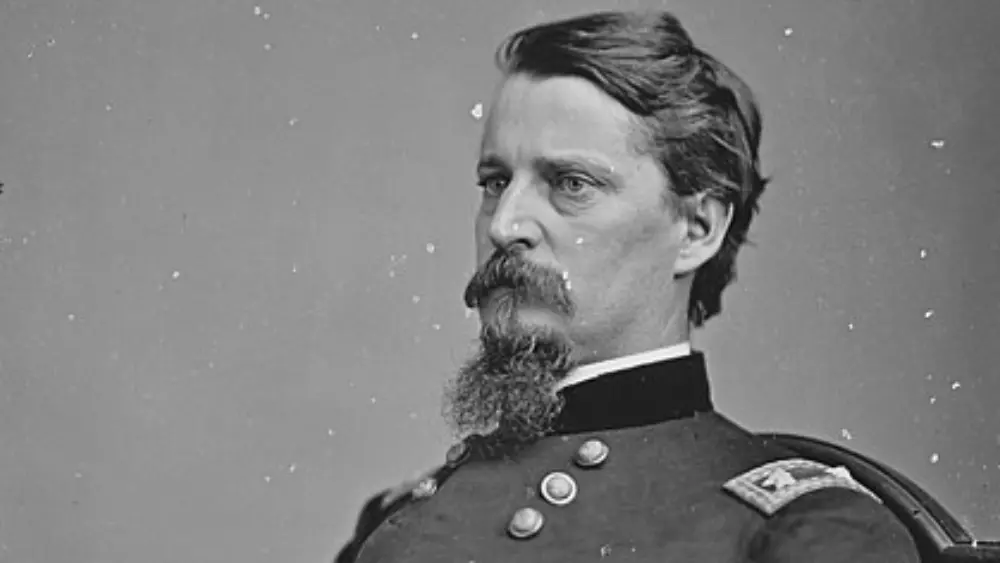Winfield Scott Hancock, a distinguished military leader and advocate for civil service reform, played a significant role in post-Civil War America. Born on February 14, 1824, in Montgomery Square, Pennsylvania, Hancock’s life was marked by his exemplary service during the Civil War and his commitment to restoring the nation during the tumultuous period of Reconstruction.
Early Life and Military Career
Winfield Scott Hancock’s early life bore a deep sense of duty and honor, qualities that would define his remarkable military career. Graduating from the United States Military Academy at West Point in 1844, he embarked on a path that would lead him to become one of the most distinguished military figures of his era. His education and training at West Point instilled in him the discipline, leadership skills, and commitment to service that would serve as the foundation for his future accomplishments in the military.
Hancock’s ascent through the ranks of the military reflected his steadfast dedication to duty and an unwavering commitment to the principles of the United States. As he rose through the ranks, his leadership abilities and strategic acumen became increasingly evident, earning him a reputation as a formidable and principled military commander. His career, spanning decades and encompassing significant moments in American history, is a testament to his exceptional abilities and enduring dedication to the service of his nation.
Winfield S. Hancock: Civil War Leadership
Winfield Scott Hancock’s leadership during the Civil War stands as a shining example of his exceptional military prowess and unwavering dedication to the Union cause. Throughout the conflict, he demonstrated not only his capability but also his remarkable courage on the battlefield. Hancock’s name became synonymous with effective leadership, earning him the trust and admiration of his fellow officers and soldiers.
Hancock’s contributions to the Civil War were far-reaching, with his leadership making a significant impact on critical battles and campaigns. His steadfast commitment to the Union cause, along with his strategic brilliance and ability to inspire his troops, solidified his reputation as one of the war’s most distinguished and respected military leaders. Hancock’s legacy in the annals of American military history is a testament to his exceptional leadership during one of the nation’s most challenging periods. His name remains etched in the hearts of those who recognize his contributions to preserving the Union and upholding the principles for which it stood.
Battle of Gettysburg
The Battle of Gettysburg stands as a pivotal moment in American history, and the leadership of General Winfield Scott Hancock during this monumental conflict is a testament to his unwavering dedication and courage. Hancock not only displayed strategic acumen but also demonstrated remarkable resilience in his role in the battle. Despite sustaining wounds during the battle, he persevered in leading his troops with remarkable fortitude. Hancock’s presence on the battlefield provided a sense of inspiration and resolve for the Union forces, bolstering their morale at a critical juncture. His leadership is often celebrated as a turning point in the Civil War, as it played a significant role in securing a crucial Union victory at Gettysburg, which ultimately shifted the tide of the war in favor of the North.
General Hancock’s actions at Gettysburg reflect the kind of leadership that defines an era and shapes the course of history. His willingness to endure personal hardship and maintain his leadership in the face of adversity symbolizes the dedication and sacrifice exhibited by countless soldiers during the Civil War. Hancock’s legacy as a leader extends far beyond the battlefield, serving as an enduring example of the resolute spirit that helped preserve the Union and pave the way for a united nation. The Battle of Gettysburg and Hancock’s remarkable leadership therein continue to remind us of the indomitable human spirit and the capacity for individuals to rise above challenges, leaving an indelible mark on the pages of American history.
Winfield S. Hancock: Reconstruction Era
After the Civil War, General Winfield Scott Hancock remained dedicated, playing a crucial role in the turbulent Reconstruction era. This era was a challenging chapter in American history, marked by efforts to rebuild and establish a new order post-fracture. Hancock’s commitment to healing and reconciliation was tested by navigating the complex politics and society during the Reconstruction period.
As a prominent military figure, Hancock played a significant role in promoting stability and fostering unity in the war-torn South. His experiences and leadership during this critical time showcased his enduring dedication to the principles of the Union. This is because he worked tirelessly to help mend the divisions that had torn the nation apart during the Civil War. Hancock’s contributions during Reconstruction underscore the profound challenges and opportunities that defined this period in American history, leaving an indelible mark on his legacy as a leader who stood by his country during its most trying moments.
Advocacy for Civil Service Reform
General Winfield Scott Hancock championed civil service reform, reflecting his commitment to fairness and government efficiency principles. In an era marked by the rampant patronage-driven spoils system, Hancock recognized the imperative of transitioning to a merit-based system. His support for this transformation was rooted in appointing qualified individuals, not merely rewarding supporters, and emphasizing competency in public roles. Hancock’s civil service reform support marked a significant step toward accountable government, prioritizing competence over political affiliation in the system.
Hancock’s dedication to civil service reform showed his belief in government better serving the people and the nation. His advocacy, amidst a spoils system, displayed an unwavering commitment to good governance, leaving a lasting legacy in civil service reform.
Winfield S. Hancock: Democratic Presidential Nominee
The year 1880 marked a significant moment in Winfield S. Hancock’s political career, as he received the nomination as the Democratic candidate for the presidency. This nomination testified to his respected military leadership and broad voter appeal, affirming his standing as a leader. Hancock’s nomination embodied the Democratic Party’s hopes to regain White House control, embodying their aspirations for the future. However, despite his notable candidacy and strong qualities, Hancock faced a formidable opponent in James A. Garfield and ultimately fell short in the presidential race.
Hancock’s 1880 campaign highlights American politics’ dynamism, where distinguished individuals can emerge as presidential candidates and shape the nation’s course. His nomination highlighted a lasting military legacy and widespread esteem, leaving an indelible mark on U.S. presidential history.
Democratic Presidential Nominee
In 1880, General Winfield Scott Hancock emerged as the Democratic Presidential Nominee, marking a pivotal moment in American political history. A distinguished military officer, Hancock had earned recognition and respect for his leadership during the Civil War, particularly for his role at the Battle of Gettysburg. The Democratic Party found Hancock a candidate embodying honor and integrity, traits they believed would resonate with Americans. However, despite his sterling reputation and military prowess, Hancock faced a formidable opponent in James A. Garfield, the Republican nominee. In a close election, Garfield’s win prompted Hancock’s reflection, shaping American democracy and future political developments.
Hancock’s 1880 nomination showcased the Democrats’ use of his military record and character to gain voter support. Hancock’s election loss didn’t diminish his legacy, emphasizing the importance of character and leadership in presidential nominee selection. This historic episode underscores the ever-changing U.S. political landscape and the enduring importance of presidential elections.

Winfield S. Hancock: Legacy of Civil Service Reform
Winfield S. Hancock’s legacy in advocating for civil service reform stands as a significant chapter in American political history. As a military leader and presidential candidate, Hancock aimed to professionalize and depoliticize the federal workforce, addressing late 19th-century concerns. He aided in laying the groundwork for future efforts to reform government employee appointments and retention, fostering meaningful change. Hancock’s dedication to merit-based hiring and a non-partisan civil service system appealed to Americans tired of the spoils system. Though unfulfilled in his lifetime, Hancock’s principled stance profoundly impacted the course of civil service reform in the U.S.
After Hancock’s advocacy, the civil service transformed, leading to the 1883 passage of the Pendleton Civil Service Reform Act. His landmark legislation was a significant step toward a more professional and efficient federal workforce, guided by Hancock’s principles. Today, Winfield S. Hancock’s civil service reform legacy stands as a testament to those who drive positive change in politics. His efforts still shape federal employee recruitment and retention, prioritizing merit and expertise over political favoritism in government.




